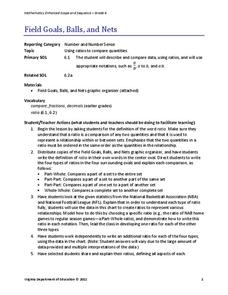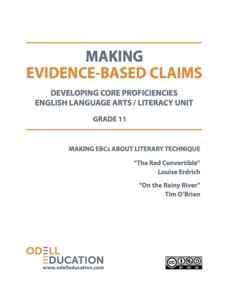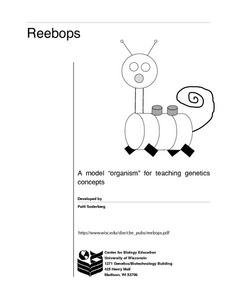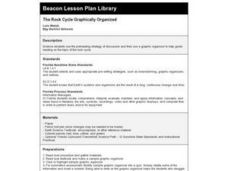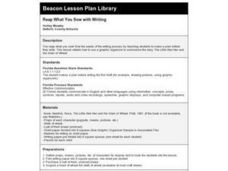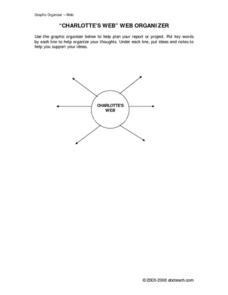LABScI
Taxonomy: Who is in My family?
Find similarities in seemingly unlike organisms. The second instructional activity in a series of 12 builds the concept of a taxonomy and explores the use of a dichotomous key. Learners begin in part one by attempting to group a set of...
Virginia Department of Education
Field Goals, Balls, and Nets
Score a resource on ratios. Young mathematicians learn about different ways to express ratios. Using sports data, they write statements about the statistics in ratio form.
Mathematics Vision Project
Module 2: Linear and Exponential Functions
Write, graph, and model all things linear and exponential. Building on the previous module in a nine-part Algebra I series, learners compare linear exponential modeling. They write equations, graph functions, and analyze key features.
Berkeley Lab
Virtual Frog Dissection Kit
Fluffy is one of the most common names for a pet frog. Fluffy, the digitized frog in this dissection kit, opens up quite literally to allow scholars to see what's inside. The basic kit encourages pupils to click on various organs to see...
Civil War
Civil War Medicine: Fact or Fiction
Young historians compare the presentation of medical care during the Civil War in passages from fictional and nonfictional texts. They examine passages from Gone with the Wind by Margaret Mitchell and Soldier's Heart by Gary Paulsen, and...
EngageNY
Writing a Position Speech: Which Food Chain Would Be Best?
Eeny, meany, miny, moe. It's time to choose a side. Scholars learn about taking a position by watching a video of a speech about local organic food. Next, pupils use graphic organizers to plan their speeches about which food chain is...
Odell Education
Making Evidence-Based Claims Literary Technique: Louise Erdrich and Tim O’Brien
Take a ride in The Red Convertible by Louise Erdrich. Students read the story and discuss whether a car is really a character. After carrying out several activities using graphic organizers and tools for making their claims in The Red...
EngageNY
Writing an Argument Essay: Evaluating the Model and Crafting a Claim (Chapter 28, Including Synthesis of Scenes in Previous Chapters)
Scholars use the model essay from the previous instructional activity to create their own argumentative essays. Readers make a claim about Atticus defending Tom in To Kill A Mockingbird. They then use graphic organizers to develop and...
Curated OER
Interpreting Characters, Setting, Plot, and Theme - The Triangle Shirtwaist Factory Disaster
Examine story development and historical disaster with your class. Learners view a video depicting the incidents surrounding The Triangle Shirtwaist Disaster. They use graphic organizers and the Internet to gather enough information to...
PBS
Who Are Latinos?
What does it mean to be Latino? With an eye-opening lesson plan, pupils discover what it means to be Latino in the United States. They participate in classroom discussions, use graphic organizers, and watch a short video to help them...
EngageNY
Reading Closely: Introducing Chávez’s Commonwealth Club Address and Considering the Plight of the Farmworker
How can a persuasive speech help inspire social change? Scholars read along as they listen to the first half of César Chávez's 1984 speech, "Commonwealth Club Address." Next, pupils use graphic organizers to analyze one of Chávez's...
Teaching Tolerance
Where We Stand
Everyone is entitled to their own opinion. Academics learn strategies to share their opinions and agree or disagree with others in a respectful manner. The resource provides scenarios to help individuals form opinions and share them with...
Center for History Education
Fighting for Whose Freedom? Black Soldiers in the American Revolution
Fight for freedom! The instructional activity delves into the world of African American soldiers during the American Revolution. Scholars read documents, such as the Dunmore Proclamation, to understand how the British government treated...
Curated OER
How To Make an Artificial Organ
Students examine the advances made in technology with regard to prosthetics and replacement organs and limbs. They describe the anatomy and functions of different organs and create their own artificial organ. They defend and present...
Curated OER
Reebops a Model "Organism" for Teaching Genetics Concepts
Reebops are cute, marshmallow-based creatures that can be used to teach inheritance. Beginning biologists draw strips of paper that represent chromosomes from two envelopes, one for the father, and one for the mother. Each parent...
Curated OER
Study Guide for Where the Red Fern Grows
One of the best fourth grade books of all time is Where the Red Fern Grows. Provide your class with interesting background on the book and the author as well as worksheets for every five chapters of the novel. The first part of the guide...
University of Southern California
Persecution of the German-Jews: The Early Years - 1933-1939
Young historians learn about the dehumanization process of stripping German Jews of basic, fundamental rights prior to the genocide of European Jews in the 1940s. Learners watch video clips of survivors who recount such events as the...
Los Angeles Unified School District
Tools for ESL Lesson Planning
Whether you are new to teaching language learners or an experienced pro you will find much to like in this massive tool kit. The 195-page packets contains teaching tips and tools, sample lesson plans and activities, worksheets and...
iCivics
Tribal Government: High School
Did you know there are 567 federally recognized American Indian and Native Alaskan tribes and villages in the United States alone? The resource helps break down the complexities of many different tribal societies to explain the concept...
Curated OER
The Rock Cycle Graphically Organized
Fourth graders use the prereading strategy of discussion and then use a graphic organizer to help guide reading on the topic of the rock cycle. They use a worksheet imbedded in this plan to guide thier inquiry.
Curated OER
Reap What You Sow with Writing
Students practice using graphic organizers to summarize The Little Red Hen and the Grain of Wheat.
Curated OER
Animals: Graphic Organizer
Second graders research information on the animal of their choice using the James E. Gerholt animal series books. They create a graphic organizer (concept web) using Kid Pix Deluxe 3 software, display information on screen, and create a...
Curated OER
Cause and Effect Graphic Organizer
In this graphic organizer worksheet, students fill in a ladder type graphic organizer with the causes and effects in a story. They fill in 6 sets of causes and effects.
Curated OER
Web Graphic Organizer for Charlotte's Web
In this literature worksheet, learners use the web shaped graphic organizer to record details about the book Charlotte's Web.



